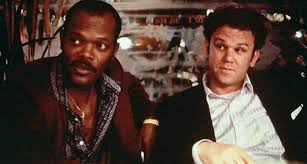Eye For Film >> Movies >> Hard Eight (1996) Film Review
Hard Eight
Reviewed by: Jeff Robson

It's always interesting to watch the first effort of a major director. Sometimes you have to make allowances for their inexperience or their desire to splurge a lifetime of ideas and inspirations onto the screen in one go. But once in a while the end result is so perfectly crafted, so scarily assured, that you know immediately that this is what they were born to do. Hard Eight is one such film.
Though now best known for his epics (There Will be Blood) and ensemble pieces (Boogie Nights, Magnolia) Paul Thomas Anderson’s debut is a tight, focused chamber piece essentially revolving around a quartet of flawed, believable characters. It’s also firmly in the tradition of classic American Noir – dark secrets and sudden twists of fate in a tough world where you just have to learn to get by – without being a slavish, over-reverential ‘homage’ to its illustrious forebears.

It opens with Sydney (Philip Baker Hall), a veteran gambler, encountering John (John C Reilly) outside a diner. A naive young drifter, John is trying to raise money to pay for his mother’s funeral but can barely afford a cigarette and a cup of coffee. Sydney offers to provide him with both, and to teach him a few lessons in survival. Suspicious but desperate, John agrees.
The two men head to Vegas, where Sydney earns a living working the tables (the title refers to rolling two fours in a dice game – the least probable but highest-paying combination) and John becomes the older man’s protégé. He enjoys the freewheeling lifestyle and falls in love with Clementine (Gwyneth Paltrow), a cocktail waitress with various ways of supplementing her income...
No prizes for guessing the odds on things continuing to tick along nicely – in a brilliantly unsettling scene the lovers’ world is turned upside down and Sydney once again has to step in to save his charge. But hotel security guard Jimmy (Samuel L Jackson) knows enough about the pair’s predicament to blackmail them – and he also knows the reason why Sydney took John under his wing in the first place.
The influences that permeate Anderson’s later work – Scorsese and Altman most prominently – are already obvious, but the film owes an equal debt to the hard-edged, brooding 50s thrillers of Aldrich, Huston and the young Stanley Kubrick as well as the classic ‘pulp’ novels of James M Cain and Jim Thompson. Life is tough and the odds are against finding peace and happiness, but redemption of a kind is possible even for a character with the darkest of pasts.
As a director, he captures the seedy glamour of the gambling world perfectly and as a writer he propels a taut, no-frills story along with a screenplay that’s literate and believable without the self-consciously hard-boiled mannerisms of Tarantino and his imitators.
But he shares Tarantino’s undoubted gift for getting the best from his actors. The film rejuvenated the career of Hall and launched that of Reilly. Both would become fixtures of Anderson’s repertory company in his larger-scale projects and each has the ability to command the screen with the minimum of effort. Their depictions of essentially small-time hustlers trapped in a world they pretend to have the measure of never strike a false note.
Bagging Paltrow post-Se7en was no mean feat and looking back across the years of accumulated celebrity baggage it’s a worthwhile reminder of what a natural, powerful actress she can be. She and Reilly spark off each other perfectly, turning the relationship between Clementine and John into an off-kilter love story in the midst of all the sleaze that most resembles Anderson’s least typical film, Punch Drunk Love.
Similarly Jackson (a very hot property after Pulp Fiction) shows a shrewd eye for up and coming talent and delivers a bad guy role that’s dialled down several notches from Jules but is equally charismatic and menacing. As if that weren’t enough, there’s a brief but memorable turn from Philip Seymour Hoffman (another Anderson regular-to-be, as well as fitting in a few other bits and bobs) as an obnoxious punter.
The fact that Anderson keeps it tight and simple means you won’t find the bravura long takes and stylistic flourishes of his later work, which may be a disappointment for some fans. But as an announcement of a major talent on the scene it stands comparison with Mean Streets and Duel – and I, for one, can’t think of higher praise than that.
Reviewed on: 07 Sep 2011

















